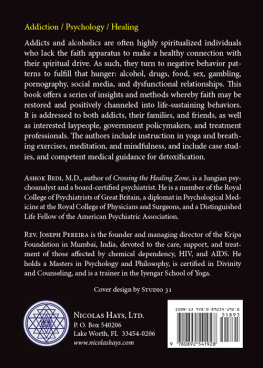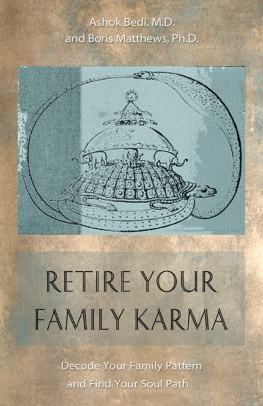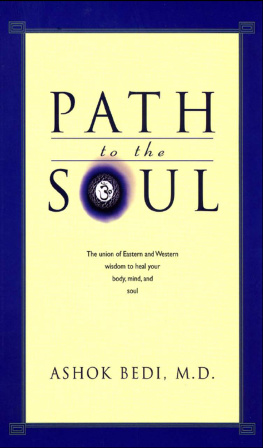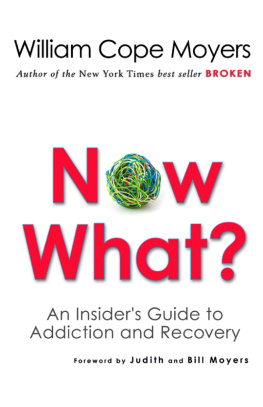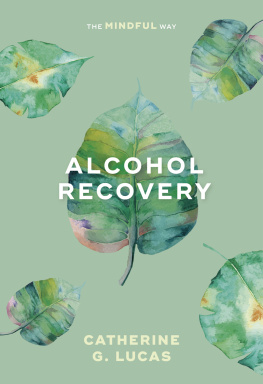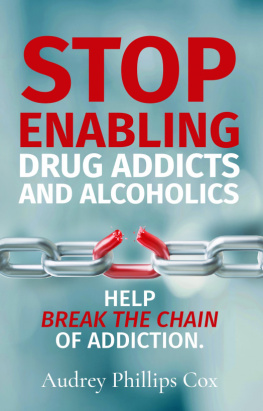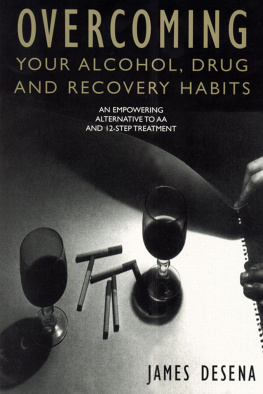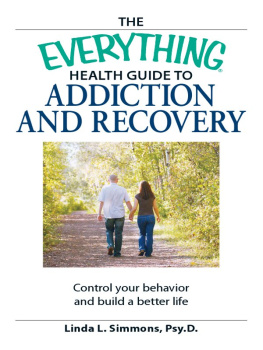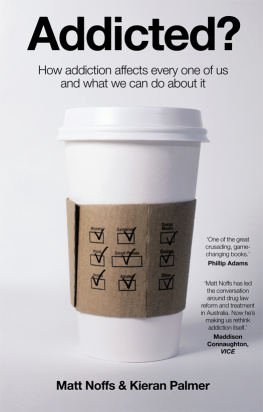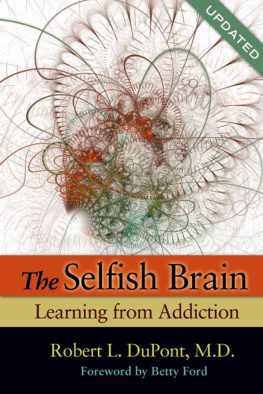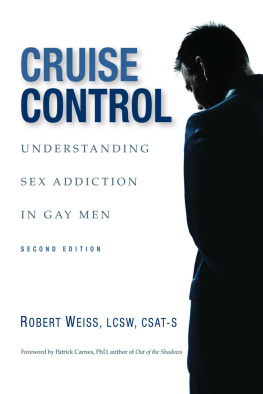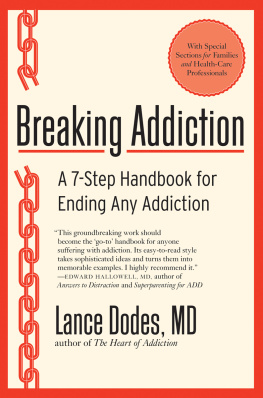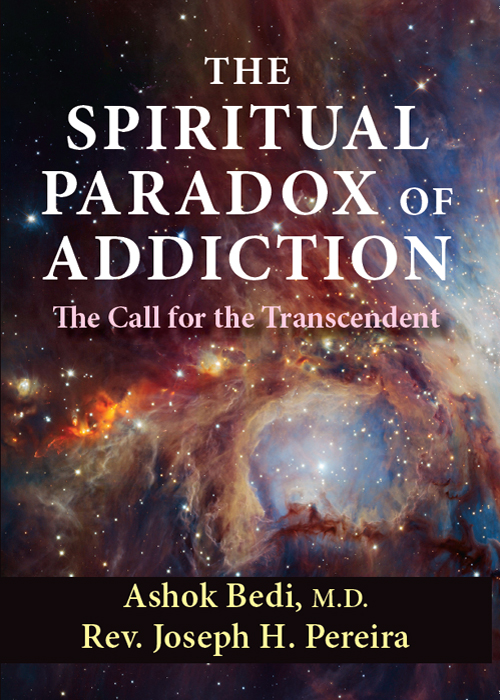
THE
SPIRITUAL
PARADOX OF
ADDICTION
THE
SPIRITUAL
PARADOX OF
ADDICTION
The Call for the Transcendent
Ashok Bedi, M.D.
Rev. Joseph H. Pereira

NICOLAS HAYS, INC.
LAKE WORTH, FL
Published in 2020 by Nicolas Hays, Inc.
P. O. Box 540206
Lake Worth, FL 33454-0206
www.nicolashays.com
Distributed to the trade by
Red Wheel/Weiser, LLC
65 Parker St. Ste. 7
Newburyport, MA 01950
www.redwheelweiser.com
First published 2017 in Mumbai, India
Copyright 2017 Better Yourself Books & Media Pvt. Ltd.
This revised edition published 2020 by Nicolas Hays, Inc.
Copyright 2020 by Ashok Bedi and Joseph H. Pereira
All Scripture references are taken from the New Community Bible
(Catholic Edition), published by St Pauls, Mumbai.
All rights reserved. No part of this publication may be reproduced or transmitted in any form or by any means, electronic or mechanical, including photocopying, recording, or by any information storage and retrieval system, without permission in writing from Nicolas-Hays, Inc. Reviewers may quote brief passages.
ISBN: 978-0-89254-192-8
Ebook ISBN: 978-0-89254-685-5
Library of Congress Cataloging-in-Publication Data
Book design and production by Studio 31
www.studio31.com
Printed in the U.S.A.
www.redwheelweiser.com/newsletter
Contents
Foreword
by an AA Member
I HAVE BEEN blessed with several decades of sobriety through Alcoholics Anonymous, its program, and its fellowship. Thus, it was with particular pleasure that I received an advance look at the manuscript of this book from Nicolas Hays, Inc. I immediately realized its teachings will have wide appeal to a group of members who have been largely without representation in AA's otherwise-excellent literature.
Alcoholics Anonymous was founded by American Protestants in the post-World War I era. Their efforts soon received the enthusiastic support of several members of the Catholic clergy. As a worldwide phenomenon, AA has grown to include adherents of Judaism, Islam, Buddhism, Hinduism, and other established world religions. Addiction respects no cultural or national boundaries.
Dr. Bedi and Father Pereira, however, here offer a voice for a large group of modern members whose spiritual preferences have not been as intimately well-served by mainstream AA literature.
I am talking about those of us who have understood our quest for higher consciousness in the language of the new age and more universalist beliefs. From the Beats to the Beatles, Western spirituality has grown to include a wide range of Eastern and alternative ideologies and practices. While we all reach for the same goals, disciples of yoga, meditation, pantheism, gnosticism, paganism, and a host of others on the roads-less-traveled have essentially had to adjust our expression to fit in and prosper in AA.
Dr. Bedi and Father Pereira describe a more open even more tolerant path, with proven techniques for embracing the spirit and the meaning of love, faith, and surrender. At the same time, they treat Christianity with a sympathetic approach to its core message that will call to the hearts of all readers.
The authors make clear that the Higher Power is equally accessible to those whose understanding of the quintessential spiritual experienceso critical to long term sobrietyis different from the more traditional vision of AA's founders over eighty years ago.
I have been extremely fortunate in being able to adapt my interior communication filters to embrace the language I most often hear at meetings. The important thing in AA is to learn to identify, not compare.
This book and its observations and advice on sobriety are a welcome addition to the literature on addiction and should be applauded by all who appreciate the Twelve Steps of Alcoholics Anonymous.
It will also prove of inestimable value to treatment professionals and friends and families, those who share an interest in the mysteries and dynamics of successful recovery, and who often have a personal stake in that process.
Preface
by + Agnelo Gracias
Emeritus Auxiliary Bishop
of the Archdiocese of Bombay
I T IS DIFFICULT to write a Preface for a book dealing with a topic with which one is unfamiliar. This is my predicament in writing a Preface for Dr. Ashok Bedi and Fr. Joseph H. Pereira's book, The Spiritual Paradox of Addiction. The path to recovery from addiction, which this book outlines, is an unfamiliar terrain for me. I must confess that I have been very much out of depth in reading the book.
And yet, I can only welcome it because of the freshness and novelty of its approach to the topic of addiction. The book starts with the surprising statement: Addicts are often spiritually driven people. It develops this by showing how addicts attempt to replicate spiritual experiences through the use of alcohol, drugs, food, sex, gambling, and other modes of addiction. In other words, the transcendent drive implodes into addictions to alcohol, drugs, food, gambling, pornography, etc. Using the legend of Faust, the authors show how the addict submits to the devil of addiction who then claims his/her life and intrudes on the life of the addict's loved ones. Making use of the same legend, the authors trace the path from addiction to redemption.
What addicts often suffer from is what the authors term a Faith Deficit. To use their words: Addicts have a great hunger for the transcendent coupled with a deficit in faith. They give different case histories to substantiate this. The book seeks to combine the AA 12-step program, the insights of Psychology, the techniques of Yoga, the teachings drawn from different religious traditions, and so onharnessing them all to set free the captives of addiction.
The authors have had a tremendous amount of expertise in dealing with addicts. They have tried to encapsulate their rich experience in this book. May the book be of help to manythat is a wish and a prayer!
June 29, the Feast of
Sts. Peter and Paul
A Note
From Dr. Ashok Bedi, M.D.
O N A RECENT visit to the Kripa Foundation in Mumbai, India, I had a fruitful dialogue with my friend Father Joe Pereira. He is the Founder and Managing Trustee of the foundation, which offers wonderful services for treating addicts and people living with HIV-AIDS. My wife Usha and I had a discussion over dinner with Father Joe about the process of addiction and the obstacles to recovery. He observed that in his experience, addicts have a faith deficit. Understanding and attending to such faith deficits could have a substantial impact on rekindling the sobriety process. Father Joe and I had discussed this matter on and off for several years. Usha suggested during this conversation that we commit our ideas to paper. This set in motion the collaboration represented in this book. Usha is my soul-guide and she inspired Father Joe and me to undertake this opus.
I work as a Jungian psychoanalyst in Milwaukee, Wisconsin. Once a week, I present a lecture to the patients at the 155-year-old Aurora Psychiatric Hospital's Dewey Center for Addiction and Recovery. It has a certain healing energy about it. Every Thursday afternoon, come rain or shine, I walk from my office to the Dewey Center to present my lecture on the spiritual and psychological aspects of the recovery process.
Next page
